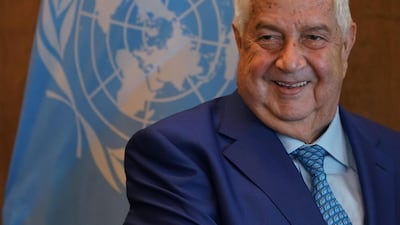Eight years into a war that has claimed more than 360,000 lives, there is finally some hope for Syria’s future. At the United Nations on Thursday, the foreign ministers of the US and several Arab and European countries called on Staffan de Mistura, UN special envoy for Syria, to urgently establish a committee to draft a post-war constitution and report on its progress later this month.
It reiterates the need for a political solution in Syria that paves the way for elections. “Those who seek a military solution will only succeed in increasing the risk of a dangerous escalation,” said a statement by the group of ministers.
The Syrian war is delicately poised, following an agreement between Russia and Turkey – two of its pre-eminent aggressors – to prevent an all-out assault on the final rebel-held enclave of Idlib.
Diplomats at the UN General Assembly have rightly sought to use the pause in bloodshed as an opportunity to kickstart a political process. Dependent on their success are the lives and livelihoods of millions of Syrians.
Unsurprisingly, representatives of the Assad regime have been pugnacious, as they position themselves to retain control of post-conflict Syria. On Saturday, foreign minister Walid Al Muallem lashed out at the US and western powers, accusing the anti-ISIS coalition of fighting "everything except terrorism" and killing civilians. The committee drafting Syria's new constitution would not accept outside dictates, Mr Al Muallem said, vowing to reject all external intervention.
Given the authority the regime has yielded to Russia and Iran, his blind rejection of outside involvement is absurd. Considering President Bashar Al Assad’s flagrant deployment of barrel bombs and chemical weapons against his own people, there is a morbid irony in the Syrian regime attacking the US for murdering civilians.
Meanwhile, the Russians and Iranians have sought to set the agenda in Syria and control its destiny with their talks held in Astana, Kazakhstan, but their exclusionary efforts have been met with deaf ears at UNGA.
There is still much work to be done to end Syria's gruesome war. On Friday, Russia started delivering powerful S-300 surface-to-air missile systems to the regime, while Iran retains its physical presence on Syrian soil. For that reason, US National Security Adviser John Bolton's remarks that the US will remain involved until Tehran's troops and clients leave were reassuring.
Meanwhile, Mr Al Muallem’s speech contained a sinister warning to returning Syrian refugees that they must abide by Mr Al Assad’s laws, or face grim consequences. It was a reminder of the immense threat the regime still poses to millions of displaced Syrians, who want only to return to a peaceful homeland.
But, at long last, a temporary cessation of violence appears to be holding, with the backing of major powers. This is a critical moment for Mr de Mistura to make inroads in Syria and establish a path to peace, elections and reconstruction. It quite simply cannot be wasted.

